Worst Foods for Prostate Health: What to Avoid and What to Eat

Prostate health is a critical yet often overlooked aspect of overall well-being, especially as men age. With prostate-related issues becoming increasingly prevalent, it is essential to understand the role that diet plays in maintaining a healthy prostate. While certain foods can cause inflammation and worsen the symptoms, others can actively promote prostate health, reducing irritation, supporting hormonal balance, and boosting overall function.
In this blog, we will delve into the ten worst foods for prostate health- those that could contribute to long-term damage or increase susceptibility to prostate conditions. We will also explore the best foods to help protect and nourish the prostate, offering a holistic approach to improving your health through dietary choices.
Understanding Prostate Health And Diet
The prostate is a small, walnut-sized gland that plays a crucial role in the male reproductive system. Situated below the bladder, the prostate surrounds the urethra and produces fluid that forms part of semen [1]. As men age, the prostate tends to increase in size, and this natural growth can sometimes lead to health concerns. While many men experience no issues with their prostate, problems like benign prostatic hyperplasia (BPH) and prostate cancer become more common, particularly after the age of 50 [2]. Suffering from these conditions can potentially affect sexual health, leading to issues like erectile dysfunction. For people experiencing such symptoms, consulting a healthcare provider about treatments such as Vidalista 40mg Tadalafil tablets or any other effective PDE5 options may be beneficial.
Key Information
- According to the Centers for Disease Control and Prevention (CDC), prostate cancer was the second most common cancer diagnosed among men in 2019.
- Benign prostatic hyperplasia (BPH), a non-cancerous enlargement of the prostate, affects approximately 50% of men between the ages of 51 and 60, as noted by Yale Medicine. This prevalence increases significantly, affecting up to 80% of men aged 70 and older.
- While the primary risk factors for prostate cancer, such as age and family history, are well-established, there are other, less understood factors, such as-
- Dietary habits
- Obesity
- Exposure to certain chemicals [4].
Enlarged Prostate Symptoms
The symptoms of enlarged prostate or BPH include-
- Inability to urinate
- Weak urine stream
- Slowed or delayed start of the urinary stream
- Incomplete emptying of the bladder
- The need to urinate 2 or more times per night
- Pain with urination or bloody urine
- Strong and sudden urge to urinate [5].
Food To Avoid For Prostate Health
Ten foods to avoid with an enlarged prostate are listed below.
Red Meat And Prostate Cancer
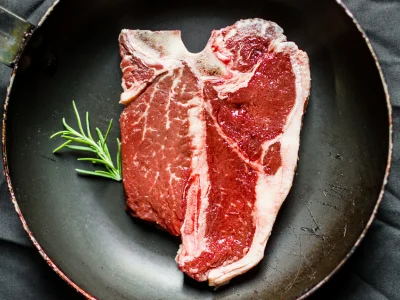
The American Institute for Cancer Research recommends limiting cooked red meat to no more than 18 ounces per week to reduce cancer risk, with even lower consumption being preferable [9].
Processed Meat
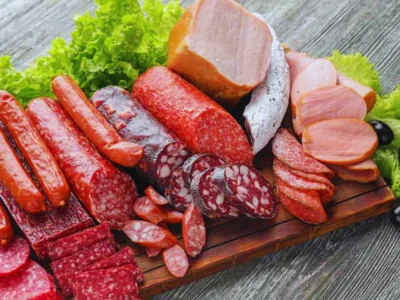
Milk And Prostate Cancer

Studies further indicate that men who drink more than two glasses of milk per day may have a higher risk of advanced prostate cancer [12]. Factors such as milk’s fat content, calcium, and hormones like insulin-like growth factor (IGF-I) are thought to contribute to this increased risk. Additionally, high calcium intake from dairy may interfere with vitamin D balance, and dairy consumption may affect testosterone levels [12].
Alcohol And Prostate Health
Health experts recommend limiting alcohol consumption to no more than two drinks per day for men to reduce health risks, including prostate cancer. Additionally, a separate study revealed that men who drank heavily (at least seven drinks per week) from their teens through their late 40s were three times more likely to develop high-grade prostate cancer [14].
But alcohol doesn’t just affect the prostate; it can also have negative consequences on sexual health. Studies show that regular drinking may contribute to erectile dysfunction by impairing blood flow and nerve function. For more insights on how certain foods and drinks can impact ED, check out our guide on the best and worst foods for ED.
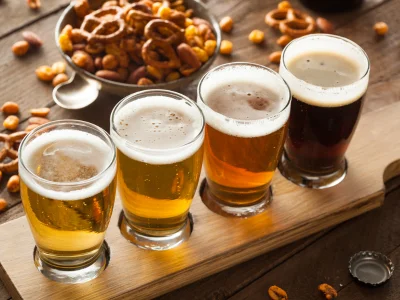
Saturated fats
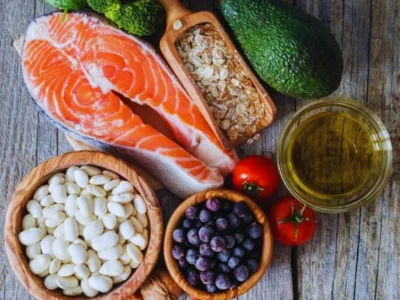
Sugar And Prostate Cancer
Research suggests a positive association between sugar intake and increased PSA (prostate-specific antigen)concentrations in men without a personal history of cancer [15].
A diet high in refined carbohydrates such as white bread, pasta, and rice has also been shown to increase the risk of prostate cancer. Refined carbs are quickly broken down into sugar in the body, leading to blood sugar spikes [16].

Excessive Sodium
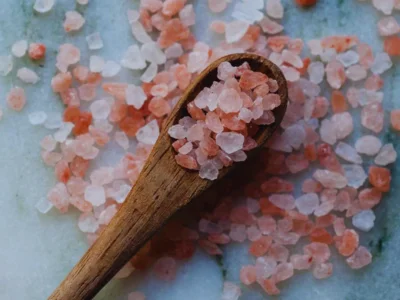
Eggs And Prostate Cancer
A 2022 study by the Cleveland Clinic highlighted that men with higher levels of choline found in eggs had nearly double the risk of developing prostate cancer compared to those with lower levels of the nutrient [19].

Refined Grains
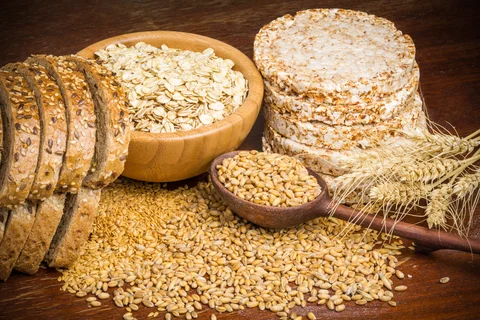
Canned Food
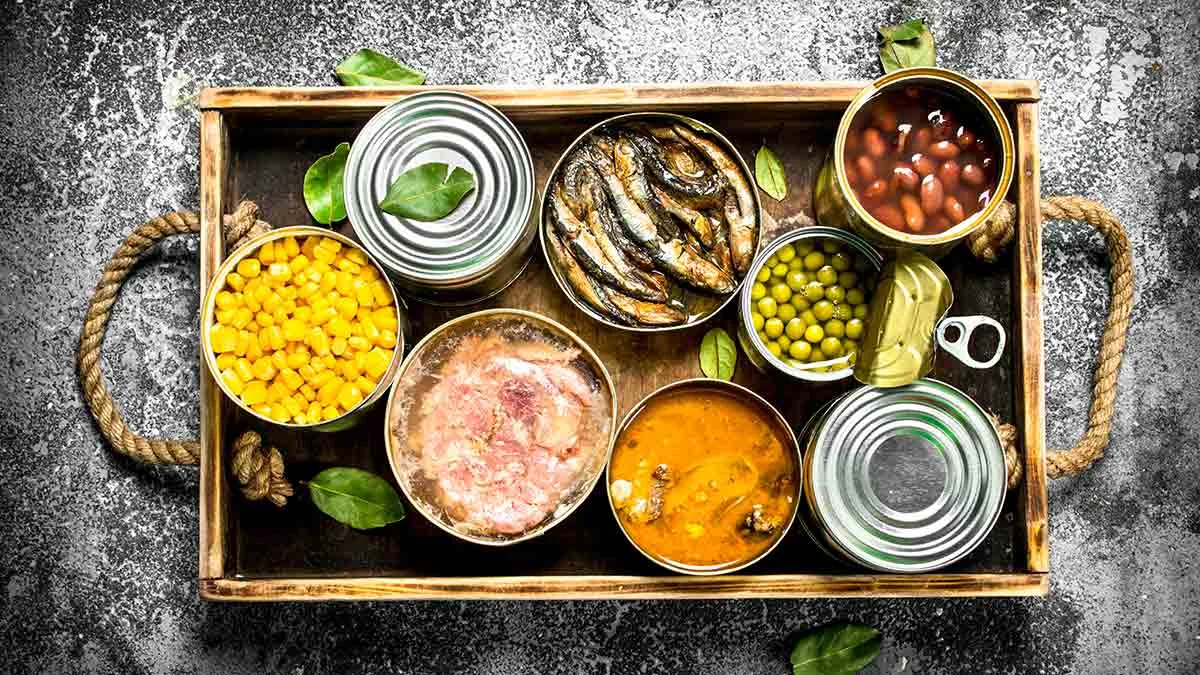
How To Shrink Prostate With Food?
Some of the effective and clinically proven natural prostate-shrinking foods are listed below.
Tomatoes And Prostate Enlargement
Lycopene, a powerful antioxidant found in tomatoes, has been linked to a reduced risk of prostate cancer. A study analyzing the effect of Lycopene on prostate cancer suggests that a diet rich in lycopene helps lower prostate cancer risk by protecting cells from oxidative damage and slowing the growth of cancer cells [20].
A review of 24 studies found that men who consumed more tomatoes were less likely to develop prostate cancer [21].
Broccoli Benefits For Men
Broccoli contains a variety of complex compounds that may help protect against cancer. Some studies suggest that a higher intake of cruciferous vegetables, including broccoli, is linked to a lower risk of prostate cancer.
Researchers believe that they contain certain phytochemicals, such as sulforaphane, which play a key role in targeting and killing cancer cells while leaving healthy prostate cells unaffected. Other cruciferous vegetables, including cauliflower, cabbage, Brussels sprouts, and kale, also contain similar protective compounds, making them valuable additions to a cancer-preventive diet [22].
Beets And Prostate
Studies have shown that beets, particularly their betanin pigment, have cancer-preventive properties. These compounds act as antioxidants and have demonstrated the ability to reduce cancer cell growth. Research further suggests that beet and beet leaf extracts may be effective as a natural treatment for prostate cancer. The key components, betanin, and apigenin, exhibit significant anti-cancer effects, potentially supporting prostate cancer prevention and treatment.
Fruits Good For Prostate
Certain fruits are known to support prostate health due to their high antioxidant content and ability to reduce inflammation. These fruits provide essential nutrients and phytochemicals that may help reduce the risk of prostate problems, including prostate cancer.
| Fruit | Why It’s Beneficial |
| Berries such as Blueberries | High in antioxidants like vitamin C and anthocyanins, which may reduce oxidative stress and inflammation. |
| Pomegranate | Contains polyphenols that may inhibit prostate cancer cell growth and improve prostate health. |
| Coconut Water | Hydrates the body and contains antioxidants and electrolytes that support overall prostate health. |
| Pineapple | High in bromelain, an enzyme with anti-inflammatory properties that may help reduce prostate inflammation. |
| Watermelon | An excellent source of lycopene, supporting prostate health and reducing inflammation. |
| Grapefruit or Citrus Fruits | Rich in vitamin C, which supports the immune system and may reduce the risk of prostate issues. |
Is Nuts Good For Prostate?
A balanced diet rich in nuts can support prostate health due to its high content of healthy fats, antioxidants, and essential nutrients.
Peanuts And Prostate Enlargement
Peanuts are rich in healthy fats, protein, and antioxidants, but their impact on prostate health is mixed. While they contain some beneficial nutrients, their high omega-6 fatty acid content could promote inflammation if consumed in excess, potentially contributing to prostate enlargement (benign prostatic hyperplasia, or BPH).
Almonds
Rich in vitamin E, almonds have strong antioxidant properties that may help reduce inflammation and oxidative stress, which are linked to prostate issues.
Cashews
Packed with zinc, cashews play a vital role in maintaining prostate health by supporting immune function and reducing the risk of prostate-related conditions.
Brazil Nuts
High in selenium, Brazil nuts can promote prostate health by helping to prevent oxidative damage and supporting normal prostate cell function.
Walnuts
Containing omega-3 fatty acids, walnuts are known to reduce inflammation and support heart health, which is closely linked to prostate function.
Managing An Enlarged Prostate
An enlarged prostate, also known as benign prostatic hyperplasia (BPH), is a common condition affecting men, especially as they age.
Effective Approaches to Managing an Enlarged Prostate include-
Lifestyle Adjustments
- Reduce fluid intake before bed to minimize nighttime trips to the bathroom.
- A healthy diet rich in fruits, vegetables, and fiber.
- Regular physical activity may help improve the symptoms.
Tadalafil For BPH
Commonly used for erectile dysfunction, Tadalafil (often prescribed under the brand name Cialis or Vidalista) has also been found effective in managing BPH symptoms. It is a safe and effective treatment for ED that works by relaxing the smooth muscles in the prostate and bladder. The use of Tadalafil improves urine flow and reduces the frequency of urinary urgency.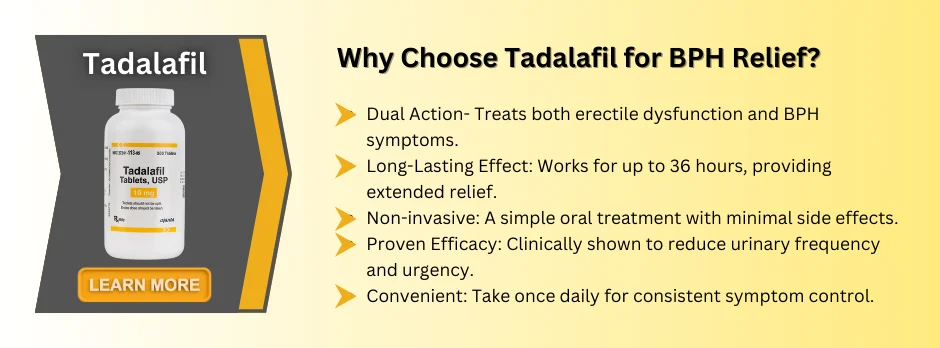
Our Final Thoughts On What Foods Are Bad For The Prostate
Maintaining a healthy prostate largely depends on the foods we consume. While certain foods like red meat, processed meats, milk, alcohol, and excessive sugar can increase inflammation and elevate the risk of prostate problems, others can provide significant protective benefits. Reducing the intake of saturated fats, sodium, and caffeine can help reduce stress on the prostate while incorporating prostate-friendly foods like tomatoes, broccoli, beets, pomegranate, and nuts can offer valuable antioxidants and nutrients to promote overall prostate health.
By making informed dietary choices, you can take proactive steps toward supporting your prostate and reducing the risk of future complications.
Prostate Diet Plan
A healthy prostate diet chart should include foods that support overall prostate health, reduce inflammation, and may lower the risk of prostate issues.
- Eat more plant-based foods such as Tomatoes (rich in lycopene), berries, leafy greens, and cruciferous vegetables (broccoli, cauliflower).
- Include nuts and seeds such as walnuts, almonds, cashews, and chia seeds (rich in omega-3s).
- Add fatty fish such as salmon, mackerel, and sardines (omega-3 fatty acids).
- Limit the consumption of red Meat and Processed Foods. Reduce dairy intake and consider plant-based alternatives such as almonds and soymilk.
- Stay hydrated.
- Limit sugar and refined carbs.
FAQs
Is chicken good for prostate?
How are sugar and prostate cancer-related?
Is yogurt good for prostate?
Is sugar bad for enlarged prostate?
Is banana good for enlarged prostate?
Is chocolate bad for prostate?
Is cashew nuts good for prostate?
Is peanut butter good for prostate?
Is coconut water good for prostate?
Why are eggs bad for your prostate?
Is shrimp good for prostate?
Is apple juice good for prostate?
Is egg white good for the prostate?
Is prostate calcification dangerous?
Is oatmeal good for enlarged prostate?
What nuts are good for enlarged prostate?
Is orange juice good for prostate?
Is honey good for enlarged prostate?
What can I drink to clean my prostate?
What is a good breakfast for prostate?
Are blueberries good for prostate?
Is drinking warm water good for prostate?
Is pineapple good for prostate?
Is watermelon good for prostate?
Is ginger tea good for prostate enlargement?
Is asparagus good for prostate?
Are almonds good for enlarged prostate?
Is omega-3 good for prostate enlargement?
Is spinach good for prostate?
Which Vegetables Good For Prostate?
Is red wine good for enlarged prostate?
Is cheese bad for prostate cancer?
Is almond milk good for prostate?
What foods to avoid before PSA test?
Is oat milk good for prostate?
Is using baking soda for prostate recommended?
Is grapefruit good for prostate?
Does heavy drinking cause prostate problems?
References
- Prostate gland - Mayo Clinic.
- What is the most common age for prostate cancer?, medicalnewstoday.
- Dihydrotestosterone - an overview | ScienceDirect Topics, ScienceDirect.
- The 7 Worst Foods for Prostate Health, prostatelasercenter.
- Enlarged Prostate (BPH) - Symptoms and Causes, Penn Medicine.
- Cancer: Carcinogenicity of the consumption of red meat and processed meat, WHO.
- Association Between Red and Processed Meat Consumption and Risk of Prostate Cancer: A Systematic Review and Meta-Analysis, NCBI.
- The way red meat is cooked can affect cancer risk, NBC News.
- Red meat and cancer: What you need to know, MD Anderson.
- Prostate Cancer Survivors Who Eat More Chicken and Less Steak May Live Longer, cancer.org.
- 4 Types of Foods to Avoid for Prostate Health, healthline.
- Does Consuming Milk Increase Your Risk for Prostate Cancer?, healthline.
- Alcohol consumption, finasteride, and prostate cancer risk, acsjournals.
- Prostate Cancer and Alcohol, WebMD.
- What Are the Worst Foods for Your Prostate? 6 Foods That May Increase Prostate Cancer Risk, GoodRx.
- A Western Dietary Pattern Increases Prostate Cancer Risk: A Systematic Review and Meta-Analysis, mdpi.
- Common salt aggravated pathology of testosterone-induced benign prostatic hyperplasia in adult male Wistar rat, NCBI.
- Do eggs increase risk of prostate cancer?, wcrf-uk.org.
- Does Eating Eggs Increase Risk of Lethal Prostate Cancer?, sperlingprostatecenter.
- Lycopene and Risk of Prostate Cancer, NCBI.
- Lycopene/tomato consumption and the risk of prostate cancer: a systematic review and meta-analysis of prospective studies, PubMed.
- 6 Foods to Boost Prostate Health, healthline.

 info@iyrinhealth.com
info@iyrinhealth.com



